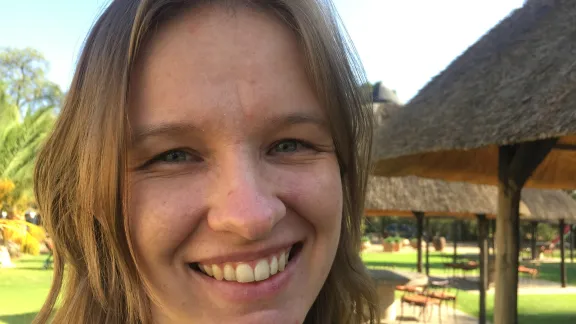
Brazilian scholar Eneida Jacobsen discussing the dynamics of capitalism, militarism and patriarchy at LWF's conference in Windhoek, Namibia. Photo: LWF/Iris Benesch
At a time in which religions have become instruments for political and economic purposes, it is relevant to ask from within a religious tradition what its true political potential may be. Three claims particularly stood up for me today at the LWF conference, Global Perspectives on the Reformation, in Windhoek. They are responses to the violent dynamics of capitalism, militarism, and patriarchy.
The capitalist discourse of shared growing prosperity disapproves itself in the face of increasing planetary economic inequality. The richest 10 percent hold almost 90 percent of the global wealth. We are encouraged to refute the general assumption that capitalism is inevitable based not only on theoretical terms, but also on the example of alternative, local models of production and economic exchange that embody more sustainable and dignifying ways of interacting with Creation. Indeed, the planet can provide for everyone's needs, but not for everyone's greed.
The belief that violence can only be overcome through violence is at the root of the perpetuation and military institutionalization of the powers of death today. This belief is shared among religious fundamentalists and democratic representatives alike. Christians are guilty of supporting war and the use of torture, and are called to exercise repentance through the public mourning of all lives taken by bombs, drones and police shooting. The religion of the crucified God mourns all death as the death of a close, beloved friend, whose unjust death reveals our deepest sins, but perhaps also entails the possibility of our salvation.
It may be easy to point out sexism when seeing an all-covered female body, dressed very differently from its male counterpart. However it is much more difficult to be aware of the less visible dynamics of gender oppression that continuously situate the male, white, national body over and against the female, black and foreign one. The Christian God is a God of transgression, who crossed the divide between human and divine, who overcame death through the miracle of bodily life. Christians are inspired by such a God to live in transgression, questioning all gender and political divides that impose death and constrain the good news of life in abundance for all.
Theology, by its very nature, finds itself in the intersection between religion, politics and economics. It reflects on the powers of life and death, and cannot be quiet in the face of the systemic exploitation and annihilation of life.
Dr Eneida Jacobsen holds a doctorate in theology from the Faculdades EST school of theology in São Leopoldo, Brazil. She is a doctoral student and graduate assistant in philosophy at Villanova University, Philadelphia, United States.


